The Marshal of the Indian Air Force Arjan Singh passed into the ages on Saturday, September 16, 2017, 52 years after he led the IAF to great success in the 1965 War.
In an interview to Rediff.com's Sheela Bhatt on the 40th anniversary of that war, the IAF's greatest warrior recalled how the air force triumphed against all odds.
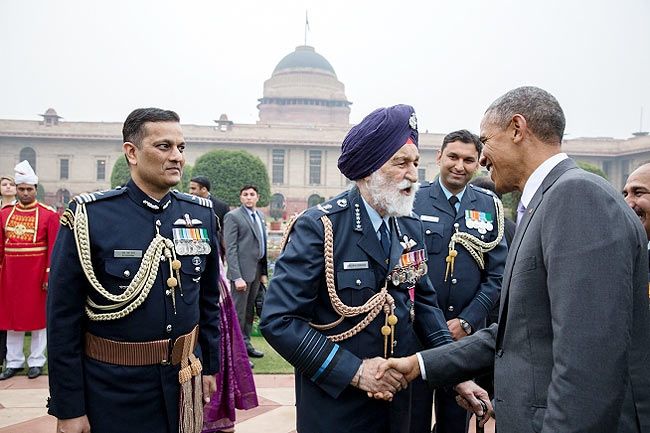
At 96, the first and only Marshal of the Indian Air Force, Arjan Singh, had come in his wheelchair and risen to give a smart salute to the mortal remains of the late President A P J Abdul Kalam, his former supreme commander.
Frail in body but certainly not in spirit, the officer has had a long and distinguished career and took over as chief of the air staff on July 16, 1964, a year before the 1965 war with Pakistan.
Born in Kohali village in Lyalpur, now in Pakistan, on April 15, 1919, he studied at the Government High School in Montgomery and the Government College in Lahore.
Selected for the Indian Air Force, he sailed for Cranwell, England, in 1938, a few months before he finished his BA degree.
But his training was cut short by World War II, which began in September 1939, and he was sent back to join the only Indian Air Force squadron which was based at Ambala.
In 1940, his Hawker Audax was shot down by the Pathans in the North West Frontier Province in what is now Pakistan. "Within two weeks, I was flying again," he said. He also fought against the Japanese over Rangoon.
He has flown over 60 different kinds of aircraft, ranging from biplanes to Gnats and Vampires.
He shared his memories of the 1965 War, ten years ago, with Sheela Bhatt. Rediff.com re-publishes the interview for readers to get a first hand account of those days of war.
"The 1965 war is a much talked about story. The militants or terrorists infiltrated Kashmir in early August of 1965. They came with an idea and an assessment that they would make the people rise in their favour and they would easily overpower our defence forces.
First, our defence forces fought quite well. Second, it was wonderful that not a single Kashmiri supported them at that time. The militants didn't get what they thought they would. No one knows how many raiders were there, but they were a few thousands of them.
There were many in civilian clothes, but they belonged to the military. Most of them were retired servicemen, so they knew how to fight and how to fire. But though they were quite determined, they could not get any help from the local people. Infiltrators can operate only if they get help from the local people.
At first, both Pakistan and India thought the fighting would be contained only within J&K.
But somehow when they knew they would not succeed in the valley, they launched a very big attack in Chamb-Jaurian, which is very close to Jammu and is on the Line of Control. Their idea was to cut the lines of communication, overpower some of the forces.
The main thing was there was a vital bridge at Akhnoor. After succeeding at Akhnoor they would have gone to Jammu and Adampor.
The attack at Akhnoor was a great success because we didn't have enough forces over there. At that point, the army said that unless they had air support they would not be able to stop them from advancing.
As far as the Indian Air Force is concerned, we have to be prepared all the time. We are not going to get any warning. We didn't in this case also. The air force just cannot say 'Give us ten days or twenty days.'
Then army chief General Joyanto Nath Chaudhury needed specific approval from the government before the air action could start. After the Chamb-Jaurian attack by Pakistan, the army requested that the air force should be used.
General Chaudhary and I went to meet then defence minister Yashwantrao Chavan. He was a very good defence minister; he was available to us all the time. He was a calm person. He also knew the military situation was not quite in our favour.
He also realised as defence minister that the air force should participate in the war if the army wants it.
He asked only one or two questions. He asked me, "How long would you take to attack?"
I told him, "It will take one hour."
In five minutes he gave us the go ahead.
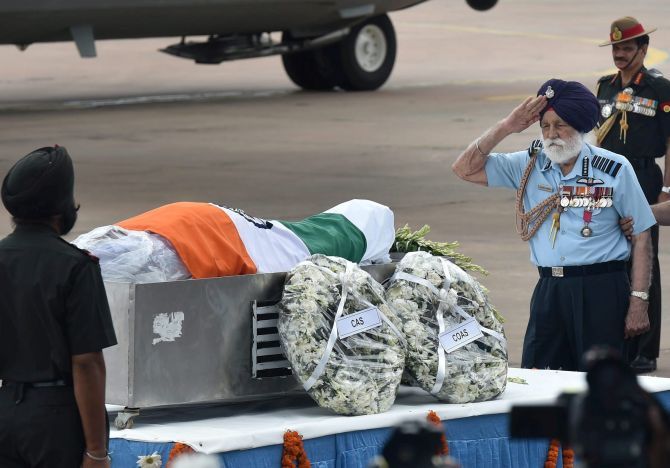
We could attack in one hour because we had our forces on alert in Pathankot due to the tense situation. We attacked Chamb-Jaurian within one hour of that order. It is a historical fact.
But once you start air action, then the war widens. It doesn't remain local, it spreads across hundred of miles.
For me the issue was only one: since I am an air force officer, I want to fight.
Pakistan was warned by then prime minister Lal Bahadur Shastri that an attack on any part of India -- and we consider the area on our side of the Line of Control part of India -- would be considered as an attack on India as a whole.
We used to meet the PM at 1, Motilal Nehru Marg. Shastri was a very cool person. He would listen to us carefully. In the end, he would say either wait or carry it out. After the infiltration began in the valley, he would meet us to discuss how prepared we were.
Second, India had to react somewhere else. In wars, the fighting is always done at the place that is favourable to you. We were fighting at a place of the opponents' choice.
You have got to decide quickly where you want to fight. Our decision was a reaction to the August 3 attack on Chamb-Jaurian, which was quite successful on the part of Pakistan.
At a crucial meeting a few days before we attacked Lahore, General Chaudhary told the PM that the situation in Chamb-Jaurian was not in our favour, and the only way to stop them was to attack somewhere else.
The army needed the prime minister's permission to open a new front in Lahore because now we were talking about the International Border which starts from south of Jammu. Pakistan thought the fighting would be limited to J&K as long as their forces continued attacking J&K.
We knew the forces Pakistan had deployed in Chamb-Jaurian sector would have to be withdrawn to fight somewhere else. Exactly that happened.
As soon as we started moving from the Amritsar front their forces from Sialkot started moving to Lahore. Jammu went into the background. You can never fight a big battle in a mountain area. You have to commit too much army and air force. Everything along the LoC has to go from Pathankot.
The enemy can interrupt just one road to stop supplies. A few people can fire at you with rockets and stop supplies. We didn't want to get into that situation.
Therefore, the attack on Lahore was a 100 per cent correct decision. There was no other way.
The government decided, naturally, on the recommendation of the defence forces, primarily of the army, that the attack should take place somewhere else. It was suitable for the army to attack on the Lahore front. It is quite true that the first attack across the International Border was by our forces, by our army. It took place at 4 am in the morning.
The army felt there was no other possible way than to deploy a lot of force over there to stop the attack. Had it mounted forces in Chamb-Jaurian it would have favoured Pakistan. Most of the Pakistan military bases -- Sialkot, Jhelum and others -- were located across the border from Chamb-Jaurian.
In our case, our forces were either in the Kashmir valley or in the barracks.
General Chaudhary was not reluctant to move ahead, but I would say he was quite cautious. That is all I would say. He was cautious because he knew his service. I didn't know the army so well.
The Indian Air Force wanted to fight. My squadron leaders and flight lieutenants, all of us were eager to fight. Unless they are keen I can't have confidence. This is an inter-connected matter. You have got to know what a person can do before you order him to do what you want him to do.
The army took a few days. Always, the movement of the army is more difficult; the air force is much easier.
We didn't need time. Our forward bases at Halwara near Ludhiana, Adampur and Pathankot were ready to strike.
They had a back-up system ready in Ambala which is a very important base. Even Agra and Hinden in Uttar Pradesh were important back-ups.
In the war you worry for the first couple of days but when you start you get so busy you don't get time to worry. In this war we saw that our fighters are able to operate anywhere in Pakistan.
We also attacked Karachi and other places. Our successful operations were in Sargodha and Peshawar. Our main task was to strike vehicles and trains carrying materials for their army. We attacked a number of army trucks and troops.
Our Canberras attacked Peshawar many times. With the Canberra we could attack any place in Pakistan. We attacked Peshawar because they had a lot of air force strength there. All those were night attacks; at that time night operations were not as perfect as today.
There was fear in Peshawar. I don't know how far it is correct, but Pakistan did move its bases into Iran to save its forces.
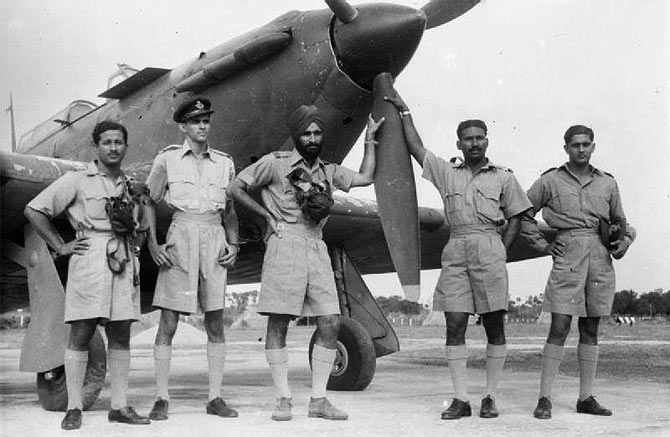
In 1965, Pakistan was well equipped. Its ability was built with America's help. Even now, America is strengthening its forces. The Pakistan army was sure and stronger in their armour than our people. Tanks are very important in armour. They would not have taken the risk of attacking Chamb-Jaurian and risking the war thereafter if they were not certain that they had a strong army.
Once war starts your main concentration is how do you do well as a whole force. When I was squadron commander I was concentrating on how my squadron does well.
We thought of defending India. We thought how our units do well during the war. Our concentration was only on that.
My experience is as you get into war you are quite afraid for the first few days. You are afraid of being shot down and afraid of being hit and so on. But afterwards, it becomes routine. You never think you are going to be shot down. That is the thinking of all fighters.
The Indian Navy was not allowed to participate. It was a government decision. Personally, I thought they should have been allowed.
About General J N Chaudhary I can say some decisions he probably took without the full consent of air force officers. General Chaudhary's aim was that his army should do well.
We didn't want to capture Pakistan. That was out of the question. We wanted them to stop any action in Jammu and Kashmir. You see, the army can't advance very much; you can't capture hundreds of miles just like that. Every time you win areas the logistics is difficult to manage.
When the army thought we couldn't reach any further both sides accepted a ceasefire. Pakistan first accepted the ceasefire.
Prime Minister Lal Bahadur Shastri consulted General Chaudhary and me before he consented. He was not willing to accept a ceasefire, but there was international pressure.
In retrospect I would say the Indian Air Force was not happy to accept the ceasefire because we hadn't suffered much losses, and lost 7 to 8 lives. We were still capable of fighting.
We had an upper hand by the time the ceasefire was accepted. We were sure that the Pakistan Air Force was not in position to face us. Their attacks on our bases in the early stages of the war were successful, but later on they lost.
Not a single Pakistan aircraft could ever attack Delhi or Agra. They only reached up to Ambala, where Pakistani aircraft destroyed the historic church.
I know Shastri resisted accepting the ceasefire for quite a long time. He was told that Pakistan had agreed to accept the ceasefire if India accepts it.
The Pakistan government's attitude was hostile towards India. They feel they didn't get a fair deal. They felt that Kashmir should have gone to them, not to us. What we know is their education is such that it creates an unhappy feeling about India. I don't think that happens in India at all.
Shastri had laid down that the air force should never attack the civilian population. We didn't hit them intentionally. We hit them in Peshawar. When I went there after the war I saw that many buildings were hit in a village. I am sure many people must have died.
In the Indian defence forces there is a desire to be better than Pakistan, in equipment, operation training and strategy, in every way and everything we did. It is so not because we don't like Pakistan. It happens because we don't know what will happen unless we are prepared all the time.
My only regret of the 1965 war is that while I had ample opportunity to fight during World War II, I personally didn't go and drop bombs in 1965. I was very keen, but the government didn't allow it. If the chief is shot down the government can be blamed.
During war you want to do something, you want to participate. The mere fact that you are dropping bombs gives you a lot of satisfaction.
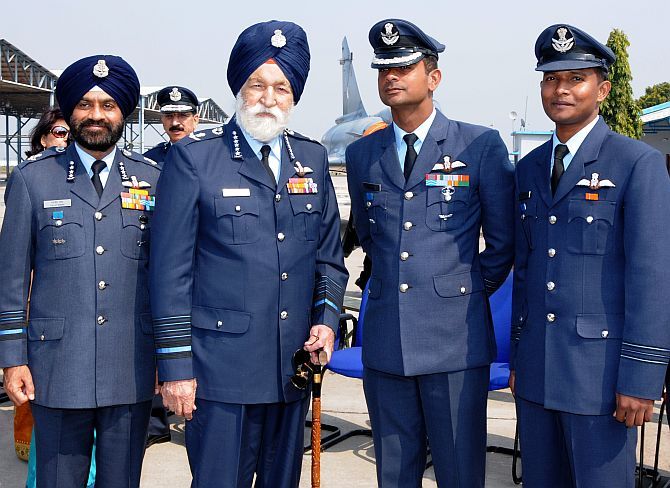
My whole life and thinking is of the air force. I don't consider myself a politician or civilian or anything else. My thinking is always as a member of the Indian Air Force.
I feel India should remember all the wars we fought, even the Second World War. Even though the Quit India movement was on, over a million Indians fought in the war. We were sent to the Burma front. I was a squadron commander. I had with me 20 officers and 200 technicians. The Japanese had captured Rangoon and were advancing. In 1944, for a year, we fought them.
That gave me a lot of confidence and the ability to assess what your force can do and cannot. You can only decide and fight if you have confidence in your services.
In 1965, we had around 12 squadrons. All our aircraft were quite good. We had the Hunter, Canberra and Gnats. Gnats were used in operations but before that they gave us a lot of trouble.
Gnats were very small aircraft, difficult to spot on the radar. As you know radar beams hit the metal of the aircraft and on return gives the blip. The smaller the aircraft, smaller the blip. So Gnats became famous. Even the radar controller would take time to decide if it is a fighter aircraft.
We found Gnats very maneuverable. For fighters the most important thing is turning in a circle. If you turn faster your attack is safe. This aircraft had a small turning circle. But it was giving us lots of technical problems.
We lost many test pilots in accidents involving Gnats. We didn't have much confidence till one of the Keelor brothers shot from the aircraft in the Chamb-Jaurian area. They both fought very well and both got the Vir Chakra.
Once one of the brothers shot down a superior Pakistani aircraft, our people got tremendous confidence. Then everybody wanted to fight using Gnats.
When we fight we forget the danger. We want to fight because of our esteem, for our unit's reputation and for our country. Why have the defence forces if we are not giving our best when our country needs it?
OUR SPECIAL SERIES: THE 1965 WAR, 50 YEARS LATER
- A grateful nation and a proud school
- The Hero of the Battle of Dograi
- Asal Uttar, the battle that turned the tide of the 1965 war
- Param Vir Chakra Abdul Hamid, a Hero's Hero
- My Father, the Param Vir Chakra Winner
- The daredevil fighter pilot who survived a Pakistani bullet
- My salute to arguably India's greatest military hero
- Two wars and a romance
- The war that helped India regain its military confidence
- The central lesson from the '65 war
- The general who saved Punjab in the '65 war








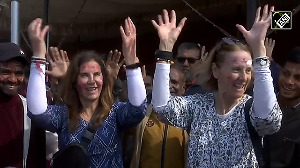
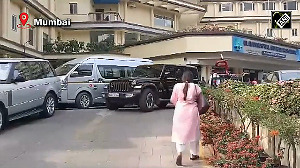
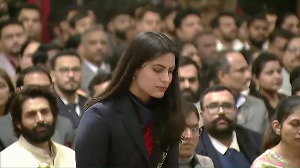
 © 2025
© 2025